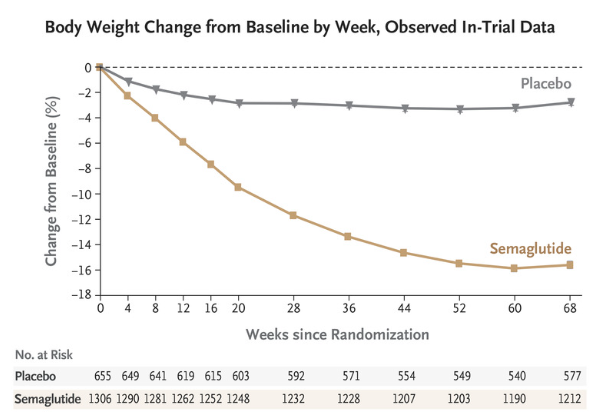The following is a transcript of the “Ozempic has changed the game forever. What does it do?” video posted on YouTube.
Ozempic has been a game changer in diabetes and obesity medicine, and you’ve probably heard about it. It was first approved by the FDA for diabetes management back in 2017, and up from that point, it was basically minding its own business, doing a lot of really great things for individuals who had diabetes. But then, in 2021, we got the publication of the STEP 1 trial.

Ozempic’s Jaw-Dropping Impact on Weight Loss
 So what happened in the STEP 1 trial is they had a group of individuals that were overweight or obese, and what they did was they split them to either get the placebo, to get Ozempic or the molecule in Ozempic called Semaglutide for a 68-week period. They aimed to see how much weight the individuals on Semaglutide would lose compared to the placebo. And to say that the results weren’t shocking would be an understatement.
So what happened in the STEP 1 trial is they had a group of individuals that were overweight or obese, and what they did was they split them to either get the placebo, to get Ozempic or the molecule in Ozempic called Semaglutide for a 68-week period. They aimed to see how much weight the individuals on Semaglutide would lose compared to the placebo. And to say that the results weren’t shocking would be an understatement.
 They found that over 68 weeks, the individuals taking Semaglutide at a dose of 2.4 milligrams once per week lost, on average, 15% of their weight from baseline. To give you an example, if you currently weigh 200 pounds and lose 15% of your weight from baseline, you would lose about 30 pounds.
They found that over 68 weeks, the individuals taking Semaglutide at a dose of 2.4 milligrams once per week lost, on average, 15% of their weight from baseline. To give you an example, if you currently weigh 200 pounds and lose 15% of your weight from baseline, you would lose about 30 pounds.
From there, the popularity of Ozempic exploded, but it wasn’t for diabetes management:
“weight loss, weight loss, easy weight loss miracle diet drug, miracle weight loss drug.”
So everybody and their dog wanted to be on Ozempic and heck, even I jumped on the train. I made this video in 2021, and to date, it is one of my most popular videos on YouTube.
Unfortunately, the unprecedented demand for Ozempic ultimately led to global shortages, including here in Canada, where the first official shortage of Ozempic has now been announced. But for those of you who might not know, what exactly does Ozempic do? Ozempic is what we call a GLP-1 receptor agonist. It mimics the hormone that our body naturally produces called GLP-1.
Your Body’s Mighty Messengers for Optimal Function
 GLP-1 is a hormone, and hormones are kind of like tiny little carrier pigeons. These hormones travel throughout your body, and when they get to their destination, they exert some kind of effect to change your physiology or whatever’s happening at that point in your body. It could be things like increasing your heart rate, improving digestion, you name it. They do everything to keep you alive and functioning.
GLP-1 is a hormone, and hormones are kind of like tiny little carrier pigeons. These hormones travel throughout your body, and when they get to their destination, they exert some kind of effect to change your physiology or whatever’s happening at that point in your body. It could be things like increasing your heart rate, improving digestion, you name it. They do everything to keep you alive and functioning.

The receptors, or destinations of the GLP-1 hormone, are found throughout the body, including within your stomach, pancreas, liver, and brain. Now, when you eat a meal, the GLP-1 hormone gets released. It gets released at this point because the GLP-1 hormone is a satiety hormone.
It is a hormone that tells us when we are full and when to stop eating. If you’ve just eaten a meal, that hormone gets released and tells the body, hey, we’re good; we don’t need to eat anymore.
Insulin Boost and Glucagon Control
In the course of its actions, it does a couple of other things, too, for managing diabetes. What it does is it goes to your pancreas, and it tells your pancreas or helps it increase insulin production. Insulin is a hormone that helps to bring your blood sugar levels down and helps to keep them at a reasonable level. It also decreases the production of a hormone called Glucagon.
 Glucagon is a hormone that increases your blood sugar levels. Both of these mechanisms play a vital role for individuals who have diabetes and who don’t produce enough insulin. As an extra bonus, the GLP-1 hormone also makes the body more sensitive to the insulin that is produced. When it comes to weight loss, though, the two things that it does is. First, it goes to your stomach and slows down the process of gastric emptying or how quickly food goes from your stomach to your small intestine. Having more food in your stomach will stimulate the sensation of fullness and get you to stop eating.
Glucagon is a hormone that increases your blood sugar levels. Both of these mechanisms play a vital role for individuals who have diabetes and who don’t produce enough insulin. As an extra bonus, the GLP-1 hormone also makes the body more sensitive to the insulin that is produced. When it comes to weight loss, though, the two things that it does is. First, it goes to your stomach and slows down the process of gastric emptying or how quickly food goes from your stomach to your small intestine. Having more food in your stomach will stimulate the sensation of fullness and get you to stop eating.
GLP-1’s Influence on Food Desire and Weight Management
 The second thing GLP-1 does for weight management, and the more important aspect, is the actions that take place in the brain. It actually works in the reward centers of your brain to decrease your wanting and drive for food. Semaglutide or Ozempic is nearly identical to the GLP-1 hormone, minus a few modifications to allow it to last longer in the body. But as a receptor agonist, it basically amplifies the effects that the GLP-1 hormone provides. So it’s not only going to help individuals that have diabetes to regulate their blood sugars better, but for individuals that are struggling with their weight, it’s going to decrease their desire for food.
The second thing GLP-1 does for weight management, and the more important aspect, is the actions that take place in the brain. It actually works in the reward centers of your brain to decrease your wanting and drive for food. Semaglutide or Ozempic is nearly identical to the GLP-1 hormone, minus a few modifications to allow it to last longer in the body. But as a receptor agonist, it basically amplifies the effects that the GLP-1 hormone provides. So it’s not only going to help individuals that have diabetes to regulate their blood sugars better, but for individuals that are struggling with their weight, it’s going to decrease their desire for food.
 If, in that process, they then create a calorie deficit, they will lose weight. Now, it’s important to note that these drugs are not magical. You still need to put in the work, increase your activity levels, be mindful of the foods you’re eating, and try to eat more whole-food options. But a drug like Ozempic will make it a little bit easier for you to do those things. So that’s great and all, and sure, everybody wants to lose weight, and we can see why that thing might be kind of popular.
If, in that process, they then create a calorie deficit, they will lose weight. Now, it’s important to note that these drugs are not magical. You still need to put in the work, increase your activity levels, be mindful of the foods you’re eating, and try to eat more whole-food options. But a drug like Ozempic will make it a little bit easier for you to do those things. So that’s great and all, and sure, everybody wants to lose weight, and we can see why that thing might be kind of popular.
Exploring the Global Drug Shortages
 But why has it become so popular, so popular that we have global drug shortages? Well, there’s a couple of reasons. First, historically, when we’ve had other weight management or weight loss medications come to market, they’ve ultimately ended up as bad news bears. They’ve been found to lead to heart issues and complications and ultimately had to be pulled from the market. Whereas Ozempic or Semaglutide and the other molecules like it are very safe.
But why has it become so popular, so popular that we have global drug shortages? Well, there’s a couple of reasons. First, historically, when we’ve had other weight management or weight loss medications come to market, they’ve ultimately ended up as bad news bears. They’ve been found to lead to heart issues and complications and ultimately had to be pulled from the market. Whereas Ozempic or Semaglutide and the other molecules like it are very safe.
In fact, we have 20-plus years with these drugs to show that they’re safe. They do what they do and don’t cause any long-term complications. Now, of course, they’re not without side effects that can potentially happen, including nausea, heartburn, vomiting, diarrhea, or constipation. The second reason why this drug is so popular is because it works. It really works. Like, It works a 15% weight loss from baseline.
 When we have that amount of weight loss that occurs, we are rivalling the amount of weight loss that we see with things like bariatric surgery. If we don’t have to cut you open to do a gastric sleeve or any other kind of surgery, well, that’s a win. Seeing results that are this effective is absolutely wild. So, with the publication of the STEP 1 trial and the other safety data trials that came out, the FDA ultimately approved Ozempic to manage obesity. Of course, to confuse you, me, and everybody else on the planet, the drug company Nova Nordisk decided to repackage Ozempic, or the molecule Semaglutide in Ozempic, under a brand new brand name called Wegovy.
When we have that amount of weight loss that occurs, we are rivalling the amount of weight loss that we see with things like bariatric surgery. If we don’t have to cut you open to do a gastric sleeve or any other kind of surgery, well, that’s a win. Seeing results that are this effective is absolutely wild. So, with the publication of the STEP 1 trial and the other safety data trials that came out, the FDA ultimately approved Ozempic to manage obesity. Of course, to confuse you, me, and everybody else on the planet, the drug company Nova Nordisk decided to repackage Ozempic, or the molecule Semaglutide in Ozempic, under a brand new brand name called Wegovy.
The Future of Obesity Medicine
So Ozempic, from the FDA, has the indication for diabetes management, whereas Wegovy, the exact same molecule in Ozempic, has the indication for the management of obesity. The reality of the matter is that Ozempic and Wegovy, they’re just the start.
 Mounjaro is the other big dog that’s currently coming to market, and it’s showing some even more impressive results in comparison to Ozempic and Wegovy. So while Ozempic or Semaglutide has been the initial game changer in obesity and diabetes medicine, the other drugs and molecules we’ve got in the pipeline will be even better. This is just the beginning.
Mounjaro is the other big dog that’s currently coming to market, and it’s showing some even more impressive results in comparison to Ozempic and Wegovy. So while Ozempic or Semaglutide has been the initial game changer in obesity and diabetes medicine, the other drugs and molecules we’ve got in the pipeline will be even better. This is just the beginning.
So that is it for today, you beautiful people. Be sure to stay tuned on my channel as I talk more about Ozempic and the other molecules coming to market. And definitely, if you’ve got value from this video, hit that subscribe button, hit that like button, and feel free to share it with someone who might need to watch it.
And as always, don’t forget that small tweaks lead to massive peaks.
References:
John P H Wilding, Rachel L Batterham, Salvatore Calanna, Melanie Davies, Luc F Van Gaal, Ildiko Lingvay, Barbara M McGowan, Julio Rosenstock, Marie T D Tran, Thomas A Wadden, Sean Wharton, Koutaro Yokote, Niels Zeuthen, Robert F Kushner; STEP Study Group. (March 18, 2021). Pub Med. Once-Weekly Semaglutide in Adults with Overweight or Obesity. Retrieved by: https://pubmed.ncbi.nlm.nih.gov/33567185/
 Dr. Dan
Dr. Dan
Follow me on social media for regular updates – @TheOfficialDrDan
Subscribe to my newsletter for a heads-up on all new content.
Sharing is caring! Here’s the social, email, and even text link – https://healthevolved.co/Ozempic-game-changer
If you need some coaching support on your weight management journey, you can book a consultation with me to see if you’d be a good fit for our program.
Questions or comments? Please send them my way on our Contact Us page!







